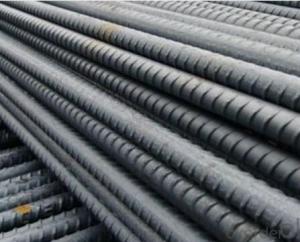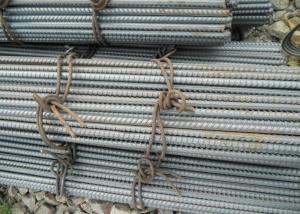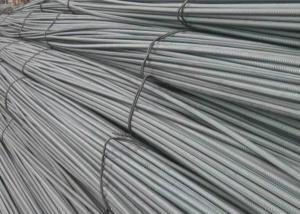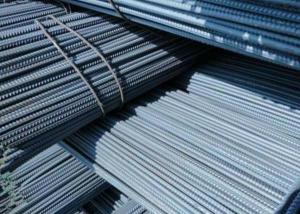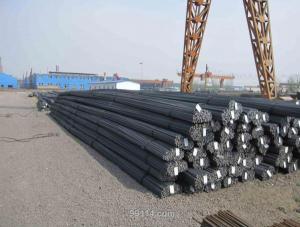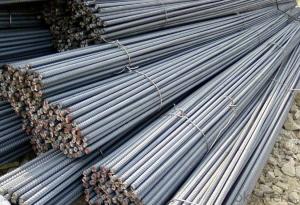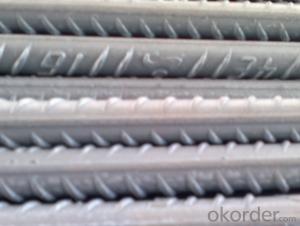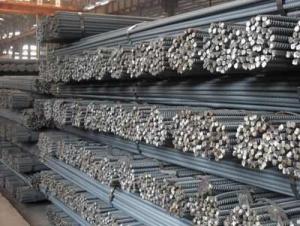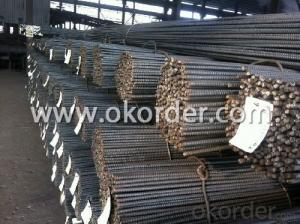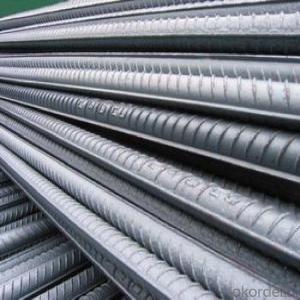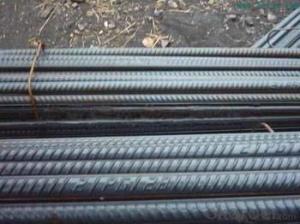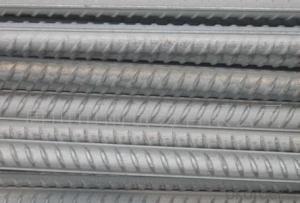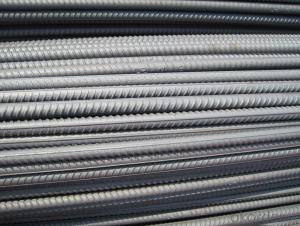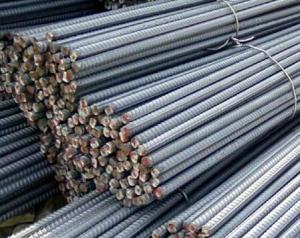GB STANDARD HIGH QUALITY HOT ROLLED STEEL REINFORCEMENT BAR
- Loading Port:
- Tianjin
- Payment Terms:
- TT OR LC
- Min Order Qty:
- 50 m.t.
- Supply Capability:
- 100000 m.t./month
OKorder Service Pledge
OKorder Financial Service
You Might Also Like
Product Description
Appearance: Black
Technique: Slitting hot rolled steel coil
Grade: Q235, Q195,A36 SS400 S235jr.St37-2
Standard: AISI,GB,DIN,ASTM,EN,JIS
Length: 6m, 9m, 12m or as your requirement.
Width: 10mm-1010mm
Thickness: 1.5mm-20mm
Place of origin: Tianjin China (Mainland)
Packaging Details: In bundles for exporting and sea worthy
Delivery Detail: Within 15-35 days after receiving L/C or deposite T/T
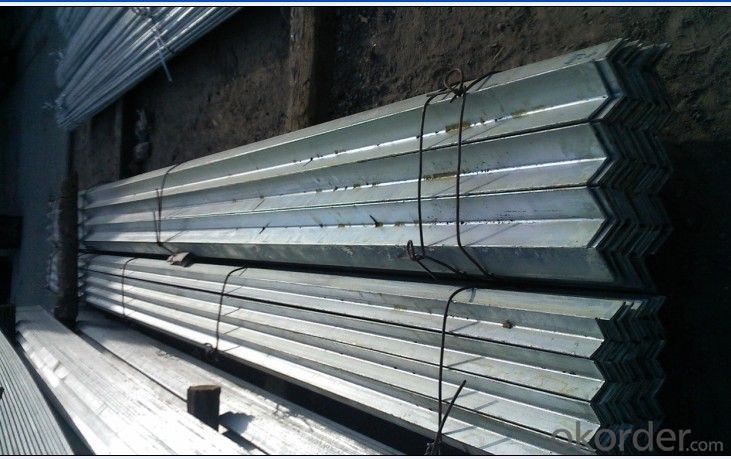
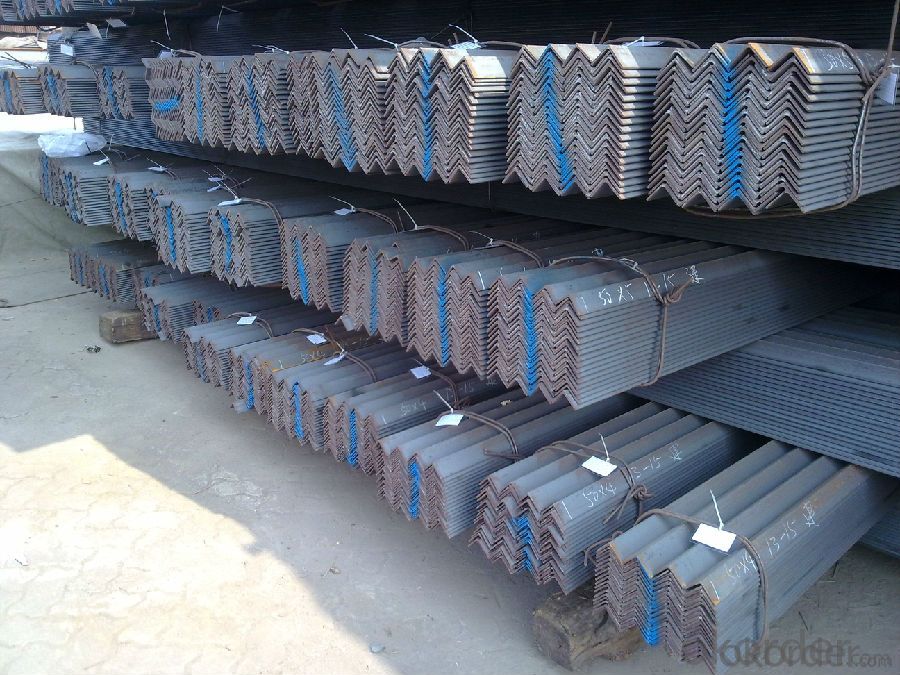
General specification as below:
Flat Bar Specification | |||
Width (mm) | Thickness (mm) | Length (m) | Theoretical Weight (kg/m) |
20 | 2.0 | 6/9/12 | 0.31 |
20 | 2.5 | 6/9/12 | 0.39 |
20 | 2.75 | 6/9/12 | 0.43 |
25 | 2.5 | 6/9/12 | 0.49 |
25 | 3.75 | 6/9/12 | 0.74 |
30 | 2.5 | 6/9/12 | 0.59 |
30 | 3.5 | 6/9/12 | 0.82 |
30 | 9.75 | 6/9/12 | 2.30 |
40 | 3.5 | 6/9/12 | 1.10 |
40 | 4.75 | 6/9/12 | 1.50 |
40 | 11.75 | 6/9/12 | 3.69 |
50 | 2.75 | 6/9/12 | 1.08 |
50 | 4.5 | 6/9/12 | 1.77 |
50 | 9.75 | 6/9/12 | 3.83 |
60 | 5.5 | 6/9/12 | 2.60 |
60 | 7.5 | 6/9/12 | 3.53 |
60 | 11.5 | 6/9/12 | 5.42 |
80 | 5.5 | 6/9/12 | 3.45 |
80 | 7.5 | 6/9/12 | 4.71 |
80 | 11.75 | 6/9/12 | 7.38 |
100 | 3.25 | 6/9/12 | 2.55 |
100 | 4.75 | 6/9/12 | 3.73 |
100 | 7.5 | 6/9/12 | 5.89 |
120 | 9.75 | 6/9/12 | 9.18 |
120 | 11.75 | 6/9/12 | 11.07 |
150 | 9.75 | 6/9/12 | 11.48 |
150 | 11.5 | 6/9/12 | 13.54 |
150 | 13.5 | 6/9/12 | 15.90 |
160 | 11.75 | 6/9/12 | 14.76 |
200 | 9.5 | 6/9/12 | 14.92 |
250 | 5.75 | 6/9/12 | 11.28 |
340 | 7.75 | 6/9/12 | 20.68 |
Products Advantages
1. high quality competitive price and Accurate in size
2. high dimensional accuracy
3. Guaranteed raw material
4.high utilization rate of material
5.convenient in construction, saving much time and labor
6. high mechanical strength
Application: Widely used for construction, Ship building, Machinery manufacturing ,steel structure,agriculture and steel grating.
- Q:What is the purpose of steel rebars in construction?
- The purpose of steel rebars in construction is to provide reinforcement and strength to concrete structures, preventing cracking and ensuring stability.
- Q:Can steel rebars be used in foundations and footings?
- Yes, steel rebars can be used in foundations and footings. Steel rebars are commonly used to reinforce concrete structures, including foundations and footings, to provide added strength and stability. They help to prevent cracking and increase the structural integrity of the foundation or footing.
- Q:How many patterns are there in threaded steel?
- There are two kinds of classification methods commonly used types of thread steel: one is to shape classification, according to different space shapes and transverse rib rib for classification or type, such as the British Standard (BS4449), the thread steel is divided into type I and type ii. This classification mainly reflects the tightening performance of the threaded steel. The two is the performance of classification (class), such as China's standard (G B1499), according to the strength (tensile strength yield point / steel) will be divided into 3 levels; the Japanese industrial standard (JI SG3112), according to the comprehensive performance of steel will be divided into 5 categories; the British Standard (BS4461) also, certain provisions of the grades of steel performance test thread. In addition, the thread steel can be classified according to the use, such as reinforced concrete, ordinary steel bars and reinforced concrete bars for heat treatment. Main uses: widely used in housing, bridges, roads and other civil engineering construction.
- Q:Can steel rebars be used for both residential and commercial construction?
- Steel rebars can serve for both residential and commercial construction purposes. They are widely employed as reinforcement in concrete structures to enhance their robustness and stability. Steel rebars are suitable for diverse construction endeavors such as residential buildings, commercial establishments, bridges, and infrastructure projects. By incorporating steel rebars, the concrete structure becomes capable of withstanding considerable loads, seismic activity, and other external forces. Regardless of whether it is a modest residential dwelling or a substantial commercial complex, steel rebars are a dependable and extensively utilized material for reinforcing concrete structures in both residential and commercial construction settings.
- Q:How do steel rebars affect the overall acoustics of a building?
- Steel rebars have a minimal impact on the overall acoustics of a building. Since rebars are primarily used for structural reinforcement, their presence does not significantly affect sound transmission or absorption within the building. However, the overall design and materials used in the construction, such as walls, ceilings, and flooring, play a more crucial role in determining the acoustics of a building.
- Q:Are there any alternatives to steel rebars in construction?
- Yes, there are several alternatives to steel rebars in construction. Some common alternatives include fiberglass rebars, carbon fiber rebars, and basalt rebars. These alternative materials offer advantages such as being corrosion-resistant, lightweight, and having high tensile strength. Additionally, some construction projects may also utilize alternatives like bamboo or plastic rebars, depending on the specific requirements and conditions of the project.
- Q:What are the different types of steel rebars available for different applications?
- For various applications, there is a wide range of steel rebars available. Some of the commonly used types are as follows: 1. Mild Steel Rebars: These rebars are frequently utilized in construction projects and have a low carbon content, making them cost-effective. They are suitable for general construction purposes and find application in residential buildings, bridges, and small to medium-sized structures. 2. High-strength Reinforcement Bars (HSRB): These rebars possess a higher tensile strength compared to mild steel rebars. They are commonly employed in high-rise buildings, large infrastructure projects, and heavy-duty structures that require greater strength. HSRB rebars are often manufactured using alloys like carbon, manganese, or silicon to enhance their strength. 3. Epoxy-Coated Rebars: To protect against corrosion, these rebars are coated with epoxy resin. Epoxy-coated rebars are commonly used in marine structures, parking garages, and areas with high humidity or exposure to moisture. The epoxy coating acts as a barrier, preventing the steel from coming into contact with corrosive elements, thereby extending the rebar's lifespan. 4. Stainless Steel Rebars: In contrast to mild steel rebars, stainless steel rebars contain a substantial amount of chromium, providing excellent resistance to corrosion. These rebars are often employed in highly corrosive environments such as coastal areas, chemical plants, and wastewater treatment facilities. Stainless steel rebars are also preferred in structures that require high aesthetic appeal, such as architectural buildings and monuments. 5. Galvanized Rebars: Zinc coating is applied to galvanized rebars to safeguard them against corrosion. The zinc coating acts as a sacrificial layer, corroding itself before the underlying steel is affected. These rebars are commonly used in areas with moderate corrosion risks, such as concrete structures exposed to deicing salts or in coastal regions. 6. Carbon Fiber Reinforced Polymer (CFRP) Rebars: CFRP rebars consist of carbon fibers embedded in a polymer matrix. They are lightweight, corrosion-resistant, and possess high tensile strength. CFRP rebars are frequently used in retrofitting existing structures, as they provide excellent strength and durability without adding significant weight. The selection of the appropriate steel rebar depends on the specific application, environmental conditions, and structural requirements. It is crucial to consult structural engineers and adhere to local building codes and standards to ensure the correct type of rebar is chosen for each project.
- Q:Can steel rebars be used in high-rise construction projects?
- Certainly, steel rebars are suitable for implementation in high-rise construction endeavors. In actuality, they are extensively employed within the construction sector due to their formidable robustness and durability. Steel rebars are commonly utilized in reinforced concrete frameworks, such as high-rise edifices, for the purpose of furnishing tensile strength and fortifying the concrete against potential fractures or breakdowns. The incorporation of steel rebars in high-rise construction undertakings is pivotal in safeguarding the structural soundness and steadiness of the building. Furthermore, steel rebars offer a certain degree of design flexibility and can be effortlessly tailored to meet the precise requisites of each individual project. On the whole, steel rebars are an indispensable constituent in high-rise construction and assume a pivotal role in guaranteeing the security and longevity of these structures.
- Q:How do steel rebars contribute to the structural integrity of a building?
- Steel rebars play a crucial role in enhancing the structural integrity of a building. These reinforcing bars, commonly known as rebars, are typically made from steel and are used to provide strength and stability to concrete structures. They are embedded within the concrete to create a composite material that can withstand various types of forces and loads. Firstly, rebars help to distribute and transfer loads throughout the structure. When a building is subjected to external forces such as wind, earthquakes, or heavy loads, the rebars act as a reinforcement by absorbing and dispersing these forces. By distributing the load over a larger area, they prevent concentrated stress points that could potentially lead to structural failure. Secondly, rebars assist in preventing cracks and fractures in the concrete. Concrete, although highly durable in compression, is weak in tension. Steel rebars, with their high tensile strength, counteract this weakness by resisting the tensile forces that may cause the concrete to crack or fail. By reinforcing the concrete, rebars ensure that the structure remains intact and can withstand various types of stresses. Moreover, rebars increase the overall durability and lifespan of a building. By providing additional strength and stability, they reduce the likelihood of structural damage, ensuring that the building can withstand the test of time. This is particularly important in areas prone to natural disasters, where the strength of a building can be a matter of life and death. Lastly, steel rebars contribute to the overall safety of a building. By reinforcing the structure, they increase its ability to withstand extreme events such as earthquakes or heavy impacts. This not only protects the occupants of the building but also reduces the risk of collateral damage to surrounding structures. In conclusion, steel rebars are essential components in construction that significantly contribute to the structural integrity of a building. Their ability to distribute loads, prevent cracks, increase durability, and enhance safety make them an indispensable element in modern construction practices.
- Q:What are the main uses of steel rebars?
- The main uses of steel rebars include reinforcing concrete structures, such as buildings, bridges, and highways, to increase their strength and durability. They are also used in the construction of retaining walls, tunnels, and other underground structures. Additionally, steel rebars are commonly utilized in the manufacturing of various industrial equipment and machinery.
1. Manufacturer Overview |
|
|---|---|
| Location | |
| Year Established | |
| Annual Output Value | |
| Main Markets | |
| Company Certifications | |
2. Manufacturer Certificates |
|
|---|---|
| a) Certification Name | |
| Range | |
| Reference | |
| Validity Period | |
3. Manufacturer Capability |
|
|---|---|
| a)Trade Capacity | |
| Nearest Port | |
| Export Percentage | |
| No.of Employees in Trade Department | |
| Language Spoken: | |
| b)Factory Information | |
| Factory Size: | |
| No. of Production Lines | |
| Contract Manufacturing | |
| Product Price Range | |
Send your message to us
GB STANDARD HIGH QUALITY HOT ROLLED STEEL REINFORCEMENT BAR
- Loading Port:
- Tianjin
- Payment Terms:
- TT OR LC
- Min Order Qty:
- 50 m.t.
- Supply Capability:
- 100000 m.t./month
OKorder Service Pledge
OKorder Financial Service
Similar products
New products
Hot products
Hot Searches
Related keywords
